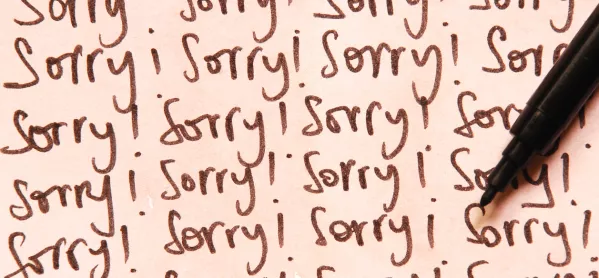Teachers are experts in modelling, including the behaviours we want to see from students. We insist on apologies, exalting their importance. So why don’t teachers apologise more when they get it wrong?
There seems to be a perception that apologising to a student (or even, at times, a colleague) is tantamount to admitting defeat or sacrificing our professional dignity. This could not be further from the truth.
Saying that we got it wrong - that we made a poor decision, that we reacted with poor judgement - makes us relatable and demonstrates to those we work with, from the classroom to the staffroom, that we act with honesty and integrity. It shows that we are dependable and credible.
Students are perceptive. They know we are not perfect, so why do we feel we must pretend be?
Why do teachers find apologising so hard?
With some colleagues, there seems to be a sense that, by admitting to having made an error, the power and status that they rely on in the classroom will be threatened, leaving them vulnerable. It is a natural fear, if an unfounded one.
We speak to students about the inevitability of failure and getting things wrong as a way of learning and growing, and the same still applies in adulthood. Teachers shouldn’t have to be infallible and, by trying to portray that unhealthy and unrealistic image, we do more harm than good to our own wellbeing.
The magnitude gap
Psychologists widely use this term to describe differences in the recall of events between victims and perpetrators. One party may see what they have done or said as a mere slip-up that should be forgotten, while the other experiences it as deeply unjust and potentially more serious.
An apology is a recognition that we can’t choose how others feel when we get it wrong, nor should we try to persuade them how they should feel.
An apology is not a justification for what we have done, but a chance to acknowledge the impact and try to make amends. In doing this, we reaffirm our position as reliable, effective and in control.
So, if you’re someone who finds yourself struggling with the “S word”, the next time the opportunity arises (which it will), embrace it as a chance to offer a genuine apology, not just token words. Try to see it as a valuable opportunity to model acknowledgement, empathy and reflection.
You may be surprised at the effect it has.
